2017 Euroleague F4, Istanbul: The evangelist…
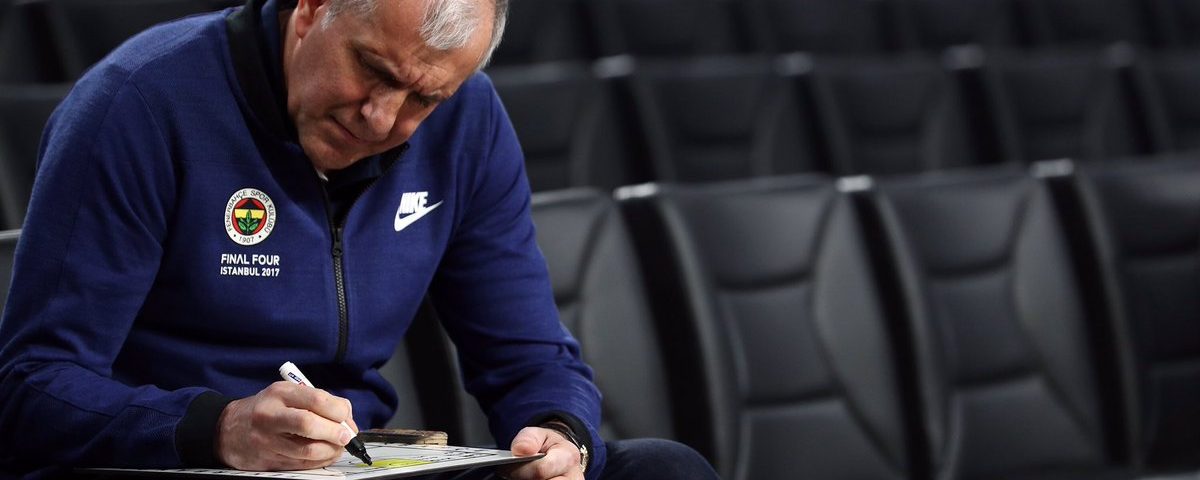
2017 Euroleague F4, Istanbul: The evangelist…
B Jim Katsionis on 24th May 2017
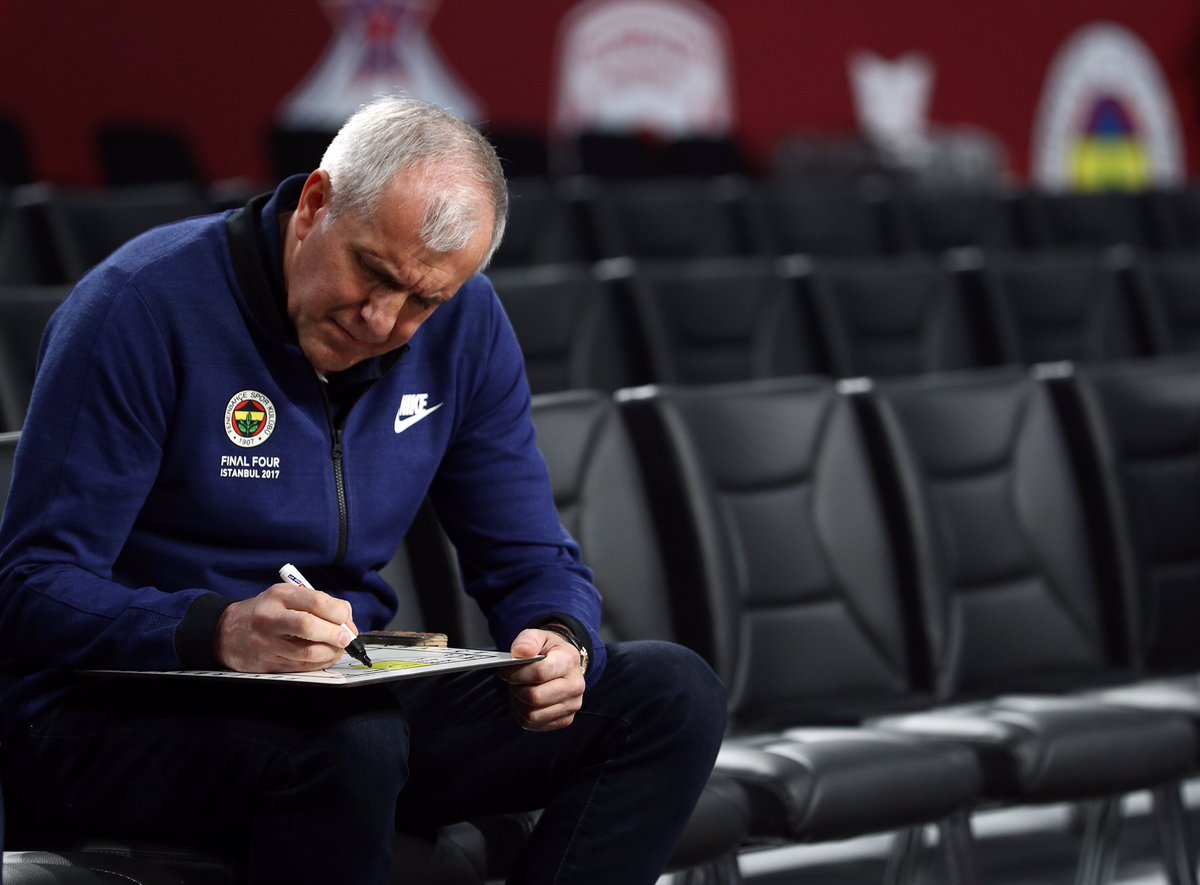
Zeljko Obradovic is back! Fenerbahce presented us with some powerful images of the recent glorious past of the Serbian “evangelist of winning”, reminded us of a symphonic orchestra that executed to perfection its last classical symphony. Pride is the only word for the great Olympiacos team and coach Sfairopoulos, who “shot down” Dimitris Itoudis’ CSKA in the semifinal and opened a new great chapter in their history. Hoopfellas on the Istanbul F4…
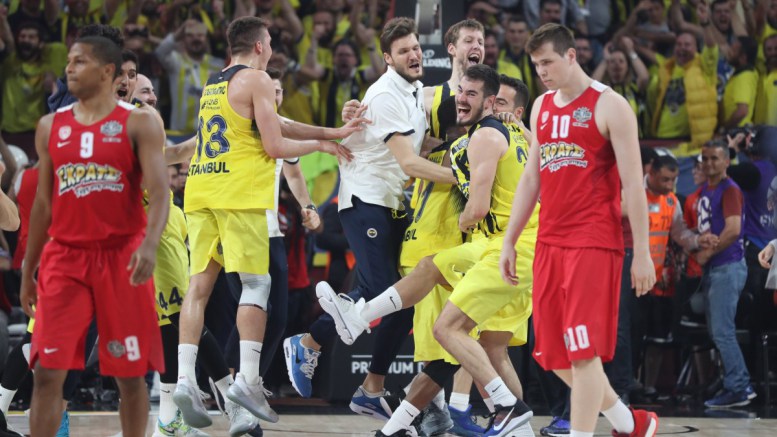
So, the Turks saw the “light of winning”. They needed a few seasons under coach Obradovic, faith in their plan when everything was falling apart, lots of money and mainly patience and persistence in their original commitment to reach the top. After last year’s nightmare in Berlin, this team was full of personalities that started the season with “On the Mission” wedged deep in their head. Fenerbahce did it by playing great basketball in their country and in front of their crowd. Obradovic, the evangelist, brought the “Enlightenment” to this country as well, and he hopes that under the circumstances that exist in the organisation of the new European champions, he will carry on dominating Europe and will instil a people with his basketball culture, just like he did with us a few years ago. Our “neighbours” should understand how lucky they are, as well as the size of the star that lights them under the basketball skies of their country, where they had the chance to have coaches such as Obradovic, Blatt and Ivkovic…
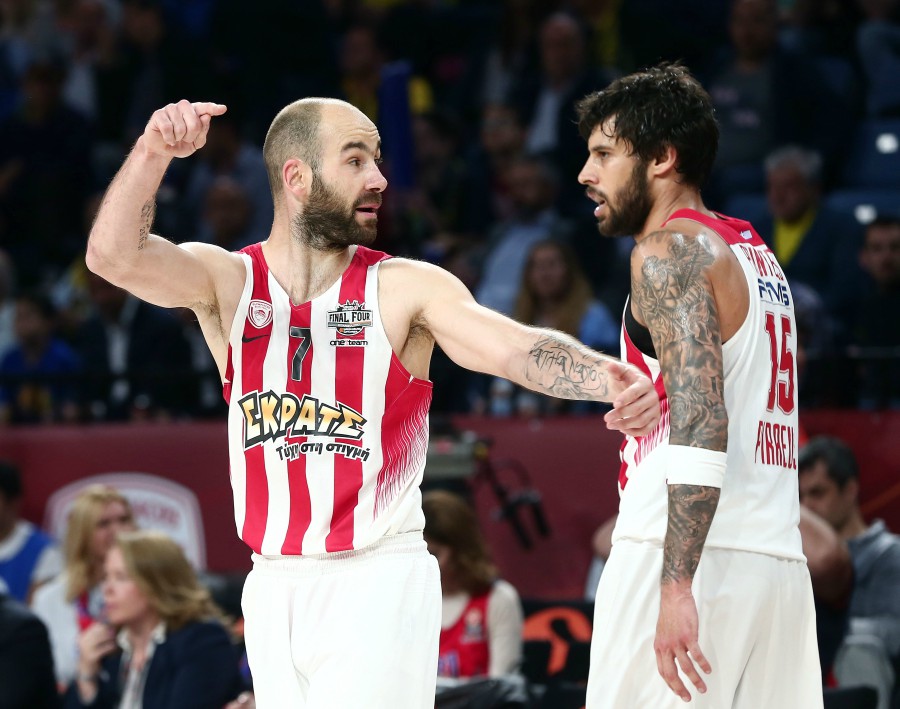
Olympiacos gave us a great night against CSKA on Friday (I told you, the ghosts are still here…). They had a great second half and completely controlled the Russians, who, once more, after their success last year are having second thoughts regarding the mental health of their organisation. The Greek team won much more than just one more title match appearance (a great feat on its own), as their experience may help improve younger players, in light of what they are building for the new season. After all, this final four proved once more why Europe is in awe of what the Greek champions have built all these years…
Let’s move on to our comments on what happened in the F4 games…
CSKA changed direction. What this on purpose of was it a subconscious choice…?
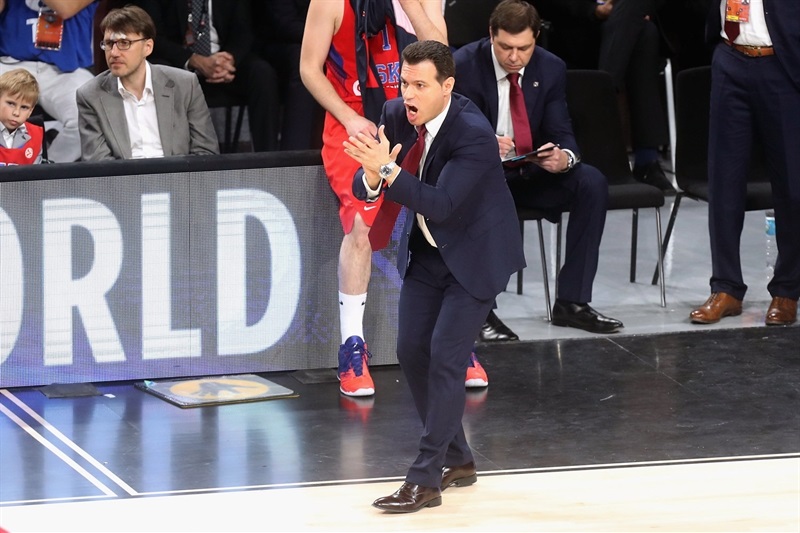
It was a bit shocking to see the direction of the CSKA offence in the semifinal of the 19th May in the context of the magnitude of change in its nature, which created a lot of questions. From the beginning of the game, Dimitris Itoudis’ team showed an unusual (both to its extent and percentages) tendency to attack only by one on one of its backcourt players and not use its famous ball movement. CSKA had 66.2% in AST% and 19.9 assists per game, but they only had 7 assists for 22 Field Goals against Olympiacos. Even if the direction of the Greek defence (Switch Everything) played a part in these numbers, it’s difficult to think that for some reason, coach Itoudis chose to go to these “uncharted waters” to put their foot on the door of the Euroleague final.
From the very beginning, the “Bear” tried to isolate one-on-one or two-on-two (mainly in the middle lane) situations and have its backcourt players take the middle lane aiming at them quickly getting their offense going (by going to the free throw line often, as they are all high percentage players in one on one plays). On one hand this doesn’t look strange when your backcourt includes De Colo-Teodosic-Higgins and Jackson (they had 36 out of the 54 FG of the Russian team in the semifinal), but on the other hand, looking at the other side of the moon, you can see that your opponent has learned how to decode and adjust better to such offences. On the contrary, as we have repeatedly pointed out, the Reds defence had difficulties against fundamental offences that work properly away from the ball and build strong communication bonds (in low times) between the strong and the weak side. These offences (Brose, CSKA) make Olympiacos run more in half court and in total run more in set game. It should be also noted that CSKA didn’t trust their “theoretical” (because they are just theoretical and depend on each occasion, and on many occasions on the night) miss matches in the paint, but made an educated choice to use their backcourt mismatches, where they might have thought that they had more of an advantage. This is how CSKA got to the point to be unable to really connect with the basket from the arc, as the four players I mentioned before had 21/25 free throws and only had 5 assists and 5 turnovers (they didn’t pass the ball much…). The famous Running Hand Off and their effort to execute on Milutinov’s back steps (elbow shot) was probably the most efficient situation for the Russian team. In essence, coach Itoudis relied on the guard based game of the team on the offensive end, and believed that at some point his opponent’s castle will fall from their offense. However, this castle has been built to fight off these kinds of attacks and it requires more patience, spirit and intellect to fall.
Giannis Sfairopoulos: plain and simple
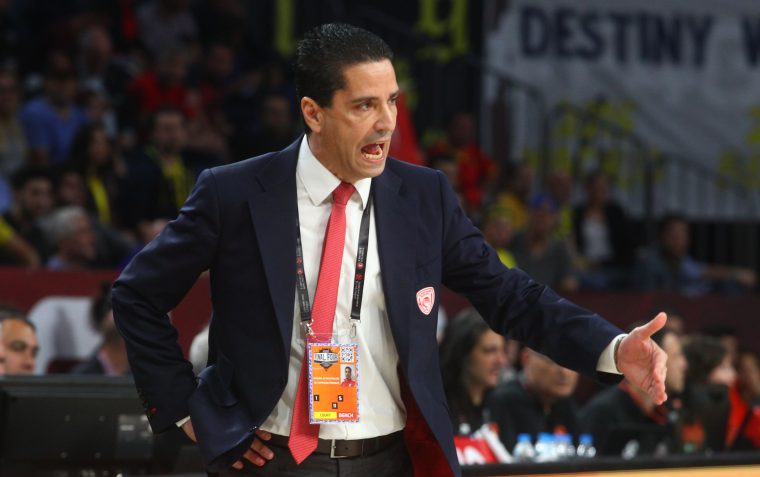
The approach of coach Sfairopoulos on the offensive end when Spanoulis (and Printezis) was not of the court, in his effort to keep his team scoring, given the fact that this year’s Olympiacos has limited sources of creation, is interesting. In the first part of the season before Daniel Hackett, who has playmaking and scoring instincts, was sidelined, the Reds relied on 2-3 High Ball Screen Format; after Hacket’s injury, they had to create different “ways” to get to the basket. The Reds used a Box offense a la Tom Crean (Marquette) with successive Cross Screens in their effort to put the ball in the low post for Papapetrou (and under certain circumstances Papanikolaou). This is a type of offence that is considered simple (this is why it is often used in smaller ages) and does not require a complex process to get the player with whom you are looking to execute in his good spot, and it produces several easy isos. It fit like a glove to the structure of the offense of the Reds for this year…
At the same time, in these periods we also saw Shuffle offense, which aimed to isolate Young deep in the paint (after locking his personal defender on his back), but Agravanis (who was excellent in the semifinal) in 1-2 occasions did not have the ability for an entry pass from the perimeter. The key for Olympiacos’ comeback in the second half (they struggled to score 33 points in the first half, but they scored 49 in the second) was the obvious intention of the Greek team to give the ball to Milutinov and break the Russian pressure with Straight Post ups low, which helped the ball move better in the half court and brought balance, which in turn created the chances for outside weak side execution, where Papanikolaou was decisive. With the point of reference being the weak side, Olympiacos “opened up” CSKA’s defence and used offensive rebounds to hurt the Russians both in terms of scoring as well as mentality, as the latter were trying to find balance. Even when the “Bear” got the point difference to double digits, they looked like they couldn’t shake off their opponent, given their inability to secure their defensive rebounds and establish their advantage…
How do you define “cheat”?
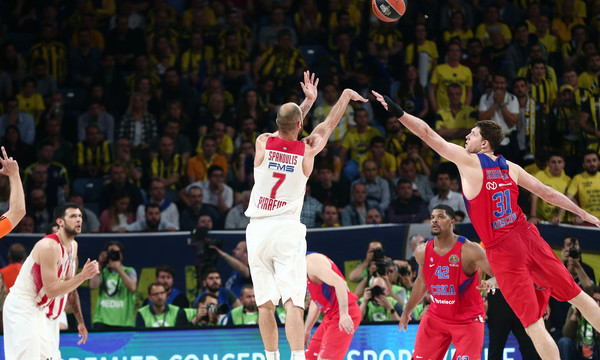
A couple of days before the semifinals, we said that the circumstances are good for Olympiacos, meaning that CSKA and their small ball/fast pace style can easily be matched by the Reds, as they have the right elements to control the tempo:
They could run with them in the court
They had the advantage in the battles above the rim and especially in rebounds.
I think that the entirety of coach Sfairopoulos’ analysis, when preparing for the match, was based on the assumption that his team would win the battle of rebounds (they could do it as the best rebounding team in the Euroleague), and that they would be able to play at their tempo by using their dominance on the rebounds. It was also one of the reasons why Olympiacos scored 49 points in the second half.
Rebound% at 4th Quarter
CSKA Moscow 41.4
Olympiakos 58.6
Olympiacos’ forwards gathered 13 of the 19 rebounds of the team, and the trio of Printezis (7) – Papanikolaou (9) – Agravanis (7) had 23 boards. CSKA found it very difficult to match this and keep them away from the basket, and while coach Itoudis insisted (which was proven wrong, at least in terms of persistence) on relying on Khryapa’s skill on the 4 out-1 in offense together with Augustine’s dive, the team was left without any rim protection in the center of the paint, when at the same time they were playing with 3 guards, with Hines-Vorontsevic-Kurbanov on the bench. Too soft…
When the match was on its way to the closing minutes, Giannis Sfairopoulos was wise to insist in a lineup that would “give away” certain things on the defensive end, but it would open up their opponents’ defense thus enabling Spanoulis to start a parade, such as the one in the Red Square to honour the Allied victory in WW2. This is why Green (who missed a few shots, but matched them with a great three pointer in the final minutes) played next to Spanoulis and Printezis-Agravanis in the frontline, in order to open up the middle lane, especially as a choice was made for Hines to not be included in the ball screens (which was possibly forgotten on Sunday night for some inexplicable reason against Udoh…).Coach Sfairopoulos defended efficiently against De Colo (-13 in the +/- for CSKA, he was harmful for his team, as opposed to Milos, who was the only player to step up when the…ghosts were making their way to the court), he used ICE in the Pick&Rolls of CSKA, aiming at keeping him on the left side and supporting it by the fact that Hines doesn’t have midrange execution that can hurt this choice. Well done, coach…
In the final stretch of the game, with Olympiacos being on fire from the three point line and their players controlling the rebounds, the scene was set for Spanoulis. His fourth period and his signature shot against Khryapa wrote another golden page in the history of the competition…
Dimitris Itoudis gave heavy minutes of guarding him to Jackson and Higgins. He chose Hedge Out with Vorontsevic, Switch or Show & Recover with Hines, depending on how the outcome of the battle of the Reds screener with the CSKA guard and where exactly in the floor the action took place. Spanoulis’ calmness in this match (even at points where tensions run high, such as a reverse judgements by the referees, a decision that he believed to be unfair or when CSKA would get the point difference to double digits) was simply decisive for everything that happened on Friday night in Istanbul. He looked like he was hypnotising and manipulating his opponents and got them right where he wanted, a result of his experience as a detailed process that has to go through all stages up to the point of his final “strike” and the win. Pain, anger, despair, patience, faith, comeback. Spanoulis goes through all of those with the same heart rate, the same look on his face. The path from the very bottom of hell to the sky and paradise is like another day at the office for him. He is a true F4 mentalist…In one of the last possessions (76-76, Teodosic had just tied the score) he calls up Green and gives him the ball, after reading that the team simply needed to attack on Teodosic’s man at that specific time. Sometimes your opponent’s defence tells you how to attack…
In the end, after everything that went on (not unexpectedly anymore) in this semifinal for once more, what is defined as cheat…? Deciding a title in a playoffs series, where teams like CSKA using their advantage will look like “beasts”, or playing another closed semifinal, where a team with Olympiacos’ mentality may manage to beat such teams, looking like a “beast” themselves in the final stretch…? (the second version, the one in effect today, has more suspense for the public, even if they … know what will happen). For, Olympiacos’ ability to play such games, makes it look “unfair”…
Read Madrid was not impressive…
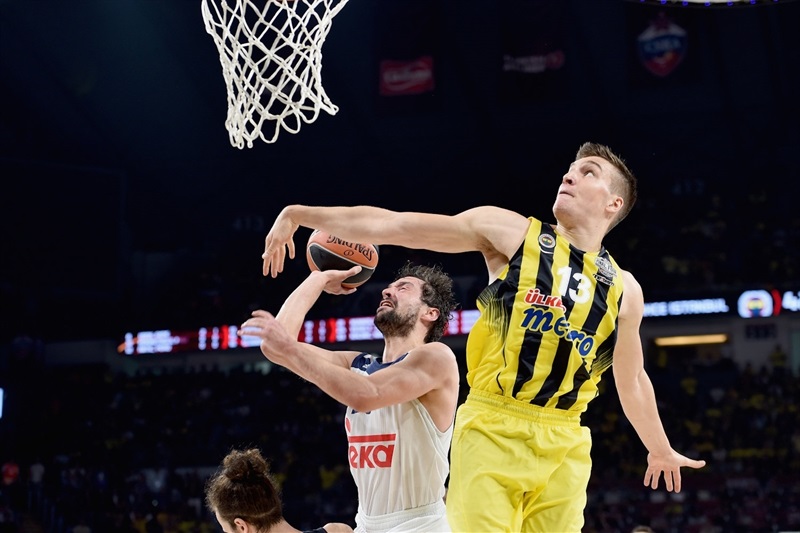
It doesn’t look good when you see teams like the “Queen” or Barcelona in the recent past being unable to bring their supporters in a F4, something that to some extent reflects on their mentality, as well as the way they approach these matches. Even though Madrid had the deepest and most talented roster this year, and went to Istanbul as the No 1 seeded team, they were unimpressive in the F4. These teams (and CSKA) look like they are waiting for the “ideal conditions” and are unable to overturn the predictions. Madrid had no “soul”. This is worse than very poor shooting nights you may have in the season. The fighting spirit of Sergio Llull (this years’s MVP) and the “nuclear warhead” called Caroll weren’t enough to beat Fener. “Madrid decided to pressure our playmakers..” Zoc said. This is why they relied on the High Post “step”, called Udoh.
We talked about Donsic…
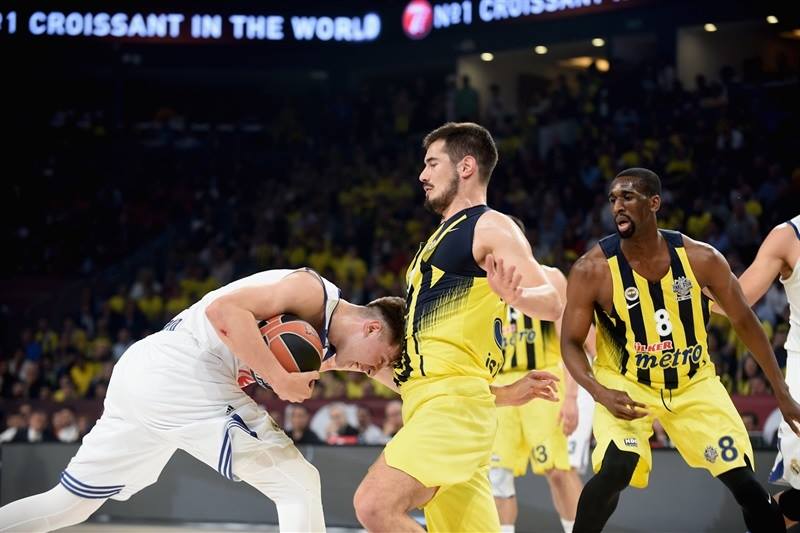
Donsic will walk on many “walls” in his career, which he will gradually learn how to overcome. Maybe in some years he will be the best players on the planet, but yesterday’s game was a lesson and it will be a point of reference in his mind. This is where he must start his preseason…
Fener’s total basketball…
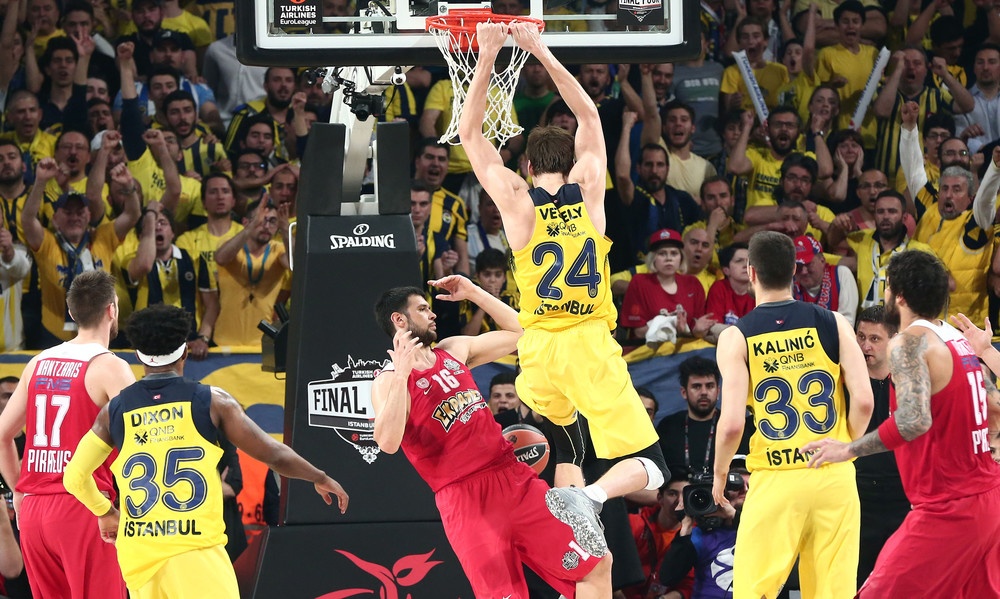
Fenerbahce reached very high standards of performance in this F4 and had one of the more well-prepared, both in terms of game and mentality, teams we have seen in the recent history of these games. There was a certainty, which started form their bench, that this is their time, and the memories of last year’s title game has provided them with a cloak of determination and a profile of anger that formed (with the help of their crowd) into the driving force of the team on their way to the final win. They were excellent, they are the fair champions…
In the comment we made a few hours before the Sunday game, I said that I have the feeling that will see a game very similar to the 2015 Madrid final. Although the start of the match with Vessely’s thunderous dunk reminded me of the Maccabi-Panathinaikos game (2005 semifinal, Saras-Baston immediately after the jump ball) in a more advanced version…
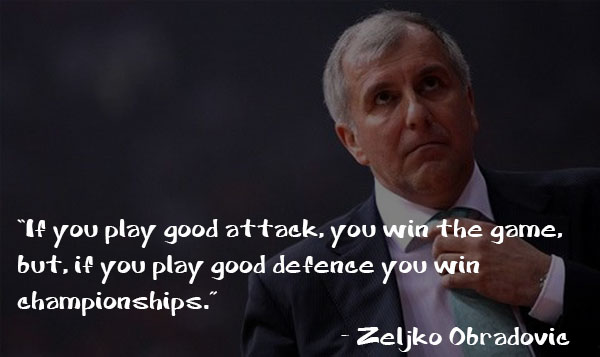
I also talked about the “turning point”, which the Reds were unable to successfully reach in the third quarter. All this happened with mathematical precision two years later. Olympiacos has managed to repel Fener and their initial attack, and this is the point where in the third quarter the championship Cup is on the table; for about 4 minutes the two teams push each other to see who will get their hands on it. This is where the game is decided. This is where Olympiacos has the one and only chance to “kill” the home team and get themselves in the driver’s seat, thus changing the roles on the court. It was later proven that they just couldn’t do it… They tried everything, but they just couldn’t win.
Death from the weak side
Obradovic is traditionally a coach who builds strong communication ties in his offense between the strong and weak side in half court. This is the means he uses to put the pressure on his opponents’ defense until it loses positions and spaces on the floor and give the stage (middle lane) to the protagonists of the Serbian coach.
Unfortunately Olympiacos burned the card of “gambling”, with Kalinic cynically punishing them for their choice to float (the centre of the key) the outside defender of the weak side. Obradovic always (ALWAYS) works in the beginning with SUCH SHOTS, of SUCH players. De facto. He looks into the player’s soul and sees the perspective and range of the possibility (I remember off the top of my head Dimitris Papanikolaou in a final against Olympiacos) to succeed. This is very important. Two completely free missed shots will not only make the defence more solid, they will also give their opponent the momentum and will slow down the initial excitement of the crowd, which will go crazy if these baskets are made. Each coach must see this and make his choice… Kalinic may not be the best outside shooter. However, in the most important stretch of the season he had 8/14 three pointers (in 4 games, Playoffs & EL semifinal) and he had the psychological background to make the shots allowed, as he was playing at home… (he finished with 12/20 in the last month, 60%…). When Olympiacos was behind in the final stretch, but their spirit made them difficult to yield, then came one of the top weak side threats in Europe to finish the game. Luigi Datome is one of the best Close out scorers at this level, having the experience of last year’s final against CSKA, when he entered the game and made important shots, after reading the conditions in the movement of the Reds defense. In total, Fener looked at their weak side (I remember a great shot by Sloukas when Olympiacos were still close, after a defensive mistake by the excellent Mantzaris) which was a safe place for them when they needed important points against a defence that had properly guarded the centre of the key.
On this night, they needed a larger arsenal…
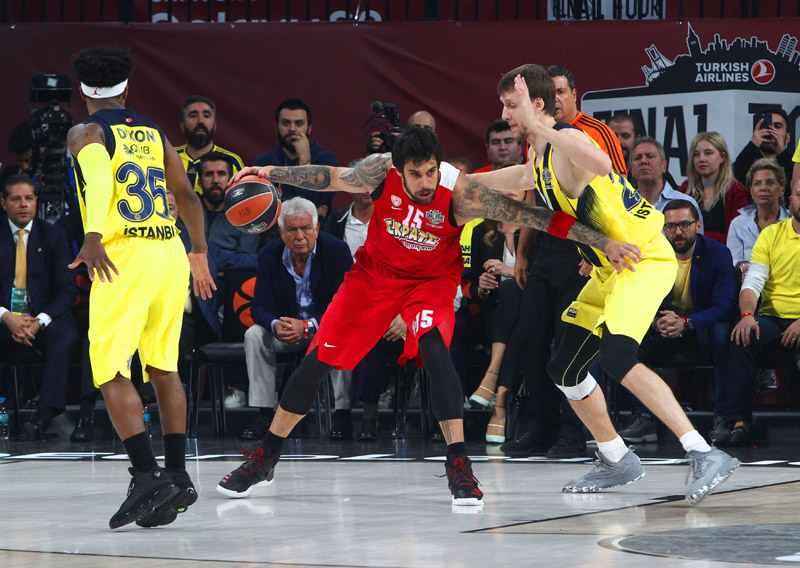
This is the feeling I got when evaluating Olympiacos’ performance. I don’t mean a larger arsenal in terms of players, but mainly in terms of skills and characteristics. With Fener having shut down Spanoulis and Printezis (5/21 FG between them) and the “emergency exit” called three pointers locked by one of the best peripheral defences throughout the season, the Reds needed a larger tank of talent. Yes, we are still left wondering how competitive they would have been, if Hackett (an important player in such a game, court and atmosphere) and Lojeski had been available…
In both F4 games Olympiacos had a good assist/turnover ratio, a true image of the main ballhandler in the centre of the key, and they were lucky enough to see their two “5”s, Birch and Milutinov, scoring 24 points with an impressive 9/9 two pointers, especially against this defense. However, it was quickly made clear that this would not be enough.
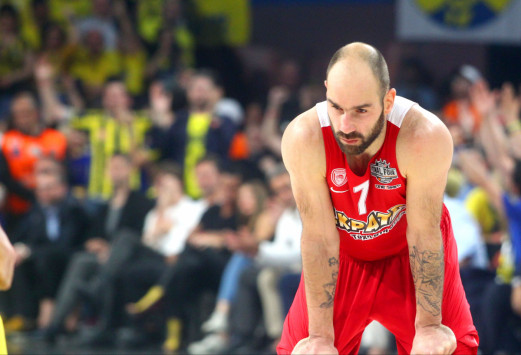
Both in the semifinal and the final Olympiacos was trailing 44-40 in the 22nd minute. The atmosphere on the floor was so different, though. Fener completely controlled the battle of the skies. They were very tough on defense in the half court game they themselves had established from the beginning of the match, aiming at their opponents having a low level of self-confidence. In the final stretch, the Turks with fundamental and very physical defence (this is what you need in these situation to lower the tempo and establish your lead in turning points, without even the need to score) that aimed at “fronting the post” and the well-worked defensive rotations that matched the lack of speed in less flexible units (Antic), put an end to the game.
Spartans
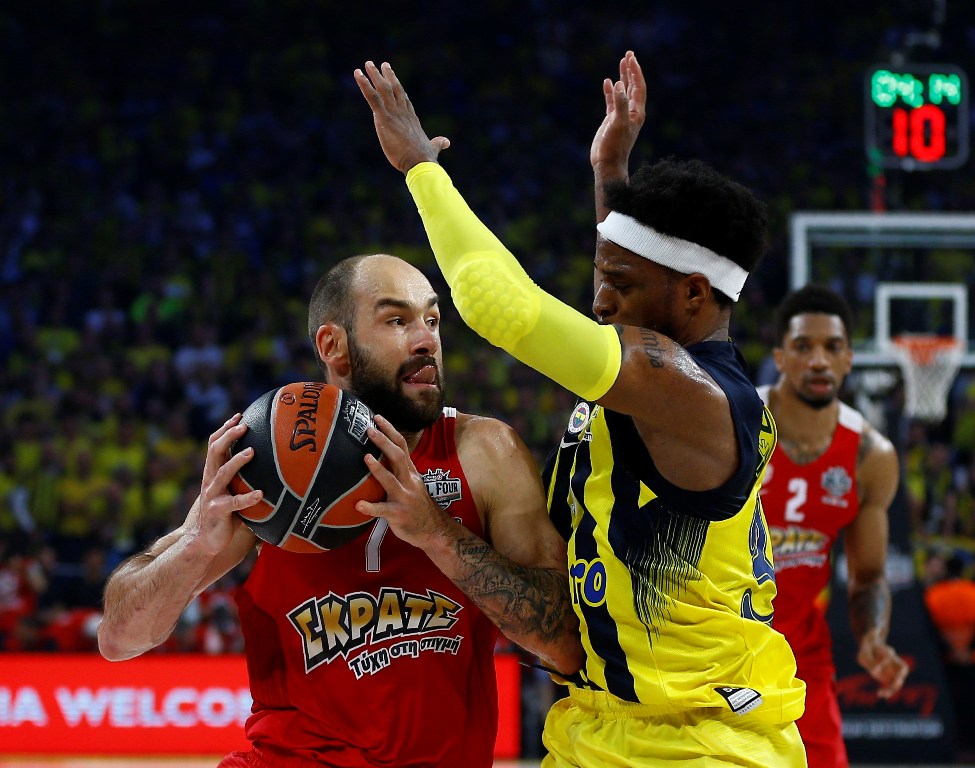
In the past I have compared modern era Olympiacos to some of Tom Izzo’s teams in Michigan State. Hardnosed teams built on the basis of team spirit with lots of intangibles, but lacking great range in scoring. Especially at nights where Printezis’ one on one game (very aggressive help from high in the low post for Fener) does not produce results, Olympiacos is not very successful in half court. Coach Sfairopoulos played Shuffle Post for Milutinov, “5-out” offense in order to open up spaces in the paint and tried a 1-3-1 Match-up zone, where he put Agravanis as the last player, which raised some concerns, as it is my belief that a forward with better perception (Papanikolaou) would have been better at this role.
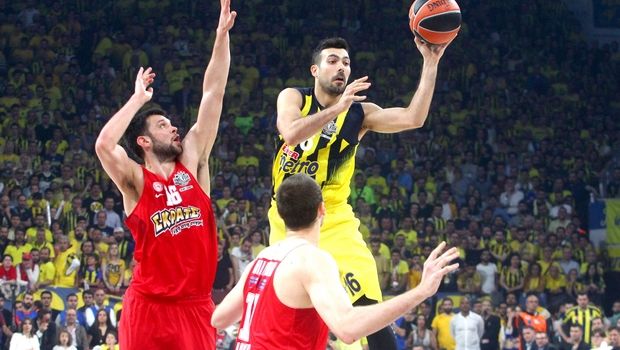
Obradovic answered with a form of overload, seeing that this zone did not put much pressure on the corners and wanted more thinking than dribbling. Fener gradually adjusted and took advantage of the momentum they had from their defense. Udoh’s presence was the key…
Bogdanovic & Udoh…
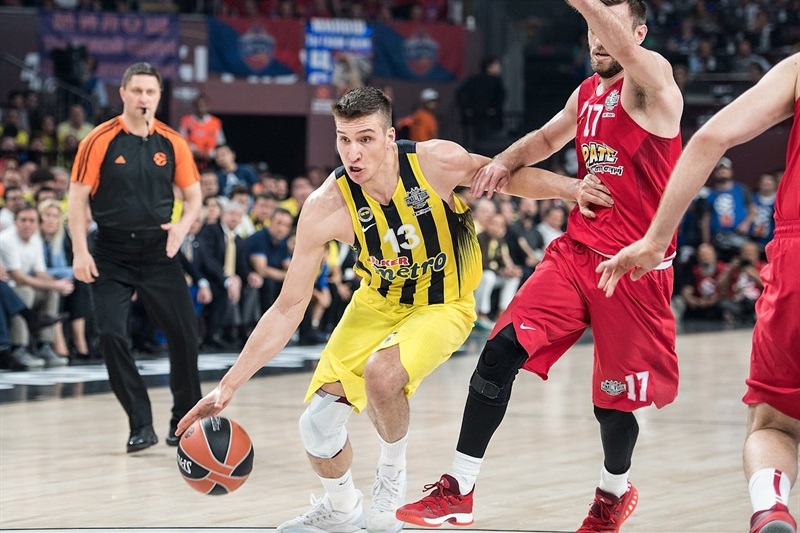
Coach Obradovic insisted on the safety of middle PnR by changing the entry play each time (Box, A-Set) and using as a step its changing into a 3-2 format before the last cooperation. The key players to execute that were the players that carried Fener in the final, crucial stretch of the season, the “Diamantidis & Batist 2017 Version”, Bogdan Bogdanovic and Ekpe Udoh. A few years later Obradovic found again two pillars and relied on their two-way talent, their character and their effect on both defense and offense.
Udoh was the player that tipped the scales in favour of Fener.
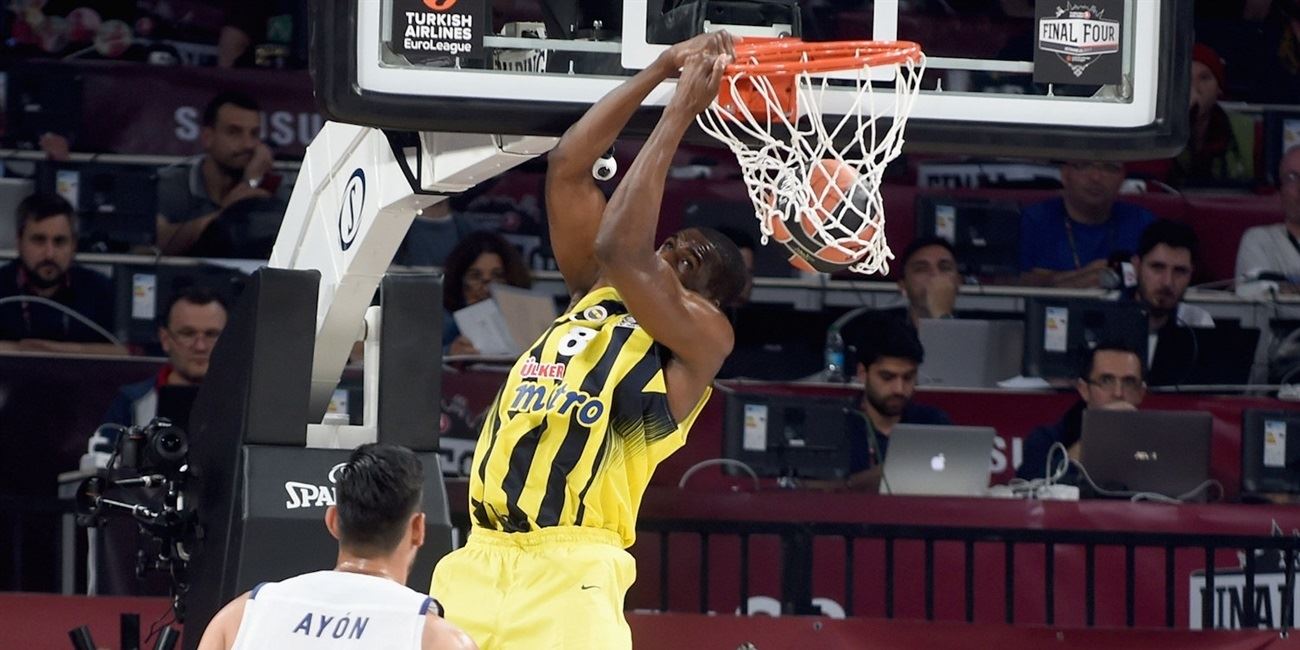
“He deserved the MVP award. He was excellent in both games. Ekpe is not that interested in scoring. Basketball is a game that depends on what your opponent does. Madrid focused on our backcourt players and Ekpe had chances to score. Today things were different. His contribution was great. I don’t remember many players with Udoh’s concentration on defence and offence” coach Obradovic said.
He was the MVP of this F4. The Baylor graduate was an unsolvable riddle for Olympiacos’ offense. 14.0 points (9/14 FG, 10/12 FT) – 10.5 rebounds, 6.0 assists, 3.5 blocks in 37.0’ were his impressive numbers. Udoh and Bogdanovic (15.5 points – 11/23 FG-5.5 rebounds) were eyewitnesses to last year’s “killing” in Berlin. They were a few inches away from Khryapa, when he rebounded the ball and tipped it in to take the game to overtime. Moreover, the key for CSKA winning was the fact that they were able to score in front of Udoh. That didn’t happen this year. Every attempt to score on the Fener Center (he totally disabled Spanoulis’ attacks, by “switching” on him in the PnR, the Greek star was wise to pass the ball to the low post) looked inconceivable and his ability in Help Defense is also impressive, to the extent that a very influential personal package is created on defense. Also, when Fener needed leadership to overcome the mental obstacles produced by Olympiacos’ toughness, Bogdanovic was there. The Serbian is a world-class player with character. I hope that you now understand our site’s persistence and love for him, a year after the Berlin final. He stayed in Europe to win and he did it. He may now cross the Atlantic as a winner. It is obvious, though, that with this duo, which really knows what Zoc wants and is now a winning duo, the Serbian coach could have dominated Europe in the next years. He ‘ll find another way.

Were there any doubts?
Olympiacos ended a great Euroleague season. The last taste was a bit bitter, but it was a great success overall. There’s no need to mention these things when you are at the top. People know and see the tools everyone uses to get there. They can evaluate, believe me. In these moments you need class (which our country lacks, luckily enough not all our players do, however it’s sad for the rest of them), optimistic looks and commitment to return to the title battles. The results speak for themselves.
Friday night reminded everyone of what Olympiacos means in the top level of European basketball. Unfortunately, the final was another case altogether, just like in Madrid two years ago. What remains for the Reds after this F4 for the new season is the excellent performances by Milutinov (he may be an important offensive weapon for the next season), Birch, Agravanis, and of course the second final for Giannis Sfairopoulos, who keeps a low profile and is serious (which I admire) in building a very good profile. It would be great for this team to have the opportunity to play a F4 in Greece in their glory days. May the chance is there … next year in Belgrade. Since there’s no other way… The picture is already very strong.
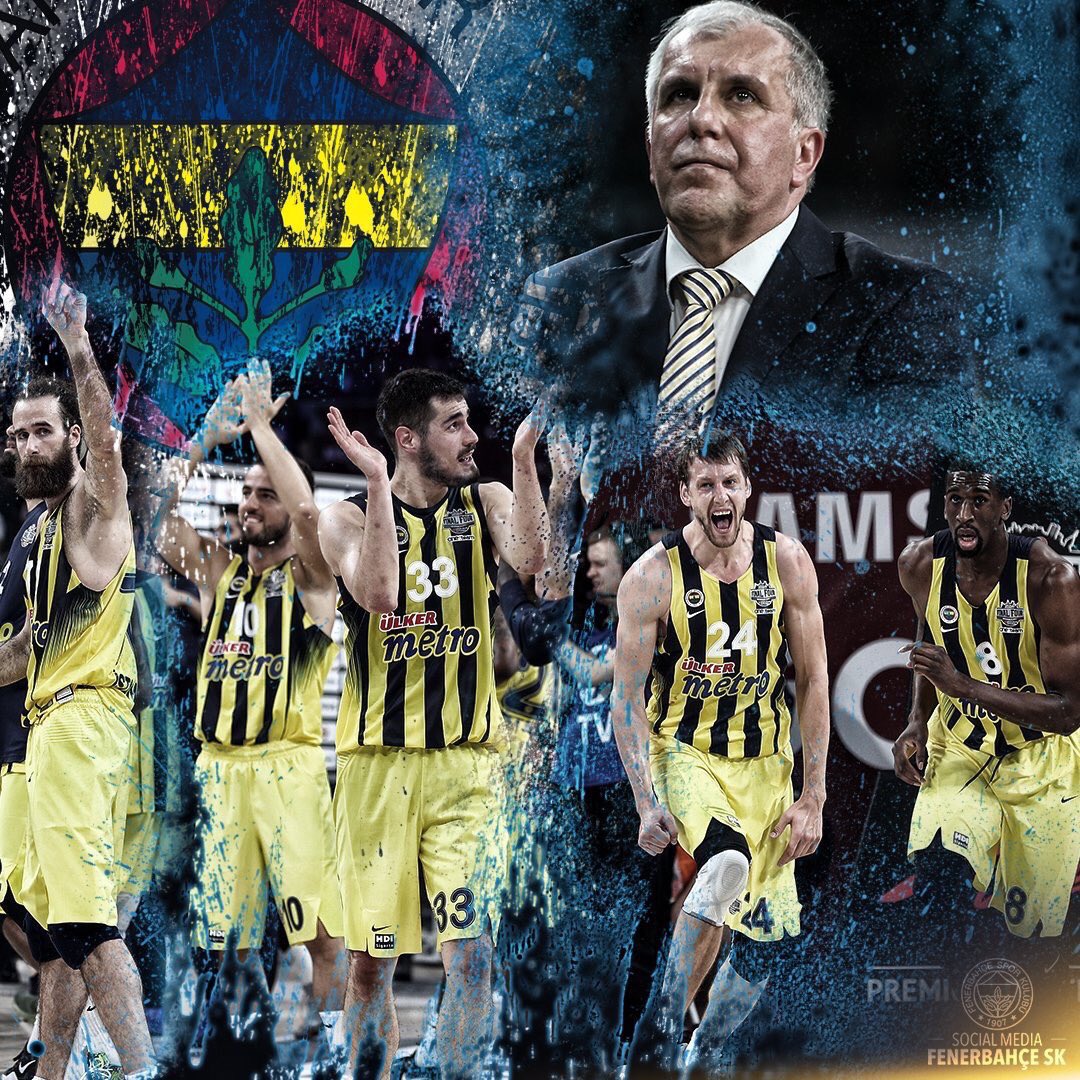
P.S. “you remember all the difficult moments in the season. I remember, for example, loosing this year against Baskonia by 36 points. Then the president came to me and we talked about everything except the game. When there is such confidence, everything is different…” (Zeljko Obradovic)
I rest my case…
P.S.1: I had “agreed” with my daughter before she sees her first light (hypnopaedia, Huxley tactics) to allow me to watch this F4. And she did… Yes, Saras, this is the most magical moment in a person’s life…
Translated by: George-Orestis Zoumpos


